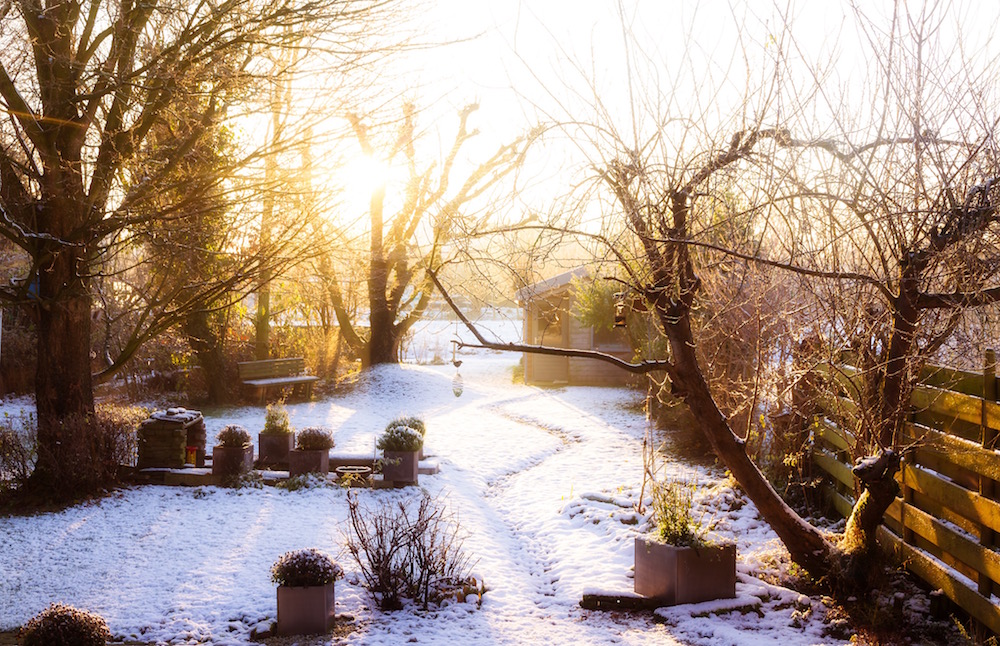Winter is a strange time for gardeners, while it is perhaps the least satisfying season regarding tending to and nurturing your garden, there is still plenty you can do to make sure that it stays healthy and in excellent condition for early spring planting. It is also a time where you can change your focus, helping winter wildlife thrive in the most challenging months of the year, and preparing and planning for new exciting planting opportunities next year too.
So what are the things you can do over winter to ensure your garden continues to look great and is kept in tip top condition ready for next year? Here are our winter gardening tips:
Take care of your soil
Hopefully, you already broke your soil down into clods before the colder weather hit. However, if you haven’t, then it is best to leave it now until temperatures start to rise again. Frozen soil is difficult to work with, and treading and compaction will only push more air out of it – try to avoid treading on the soil where possible and keep kids and pets off it too.
Have a garden overhaul
Forget spring cleaning! Winter is the best time of year to give your garden a good clear out. Get rid of any stacks of plastic plant pots you never use, clear out tool sheds and check your gardening tools to make sure they are all working and in good condition. There is still time to pop something on your Christmas wish list if not! You can care for your tools and increase their lifespan by using a good tool sharpener, keeping them clean to prevent the spread of disease and oiling regularly to prevent any stiffness.
Look after your lawn
You can prepare you garden in the winter months and lay out new lawn turf and seed from the end of January. Use the winter to check your lawn, note and rectify any potential drainage problems and give any plants or trees – particularly fruit bearing trees that grow in the grass, a good feed with a top quality fertiliser.
Check your structures
Winter is an excellent time to check out your structures too. Inspect your greenhouse, conservatory, and any wooden structures in the garden. Repair any damage while also cutting away any dead material from summer climbers.
Get Pruning!
Take the best care of fruit trees, shrubs, rose bushes and hedges by giving them a once over with the secateurs. Cut so that water slopes away from the bud and can’t collect on it and make sure you use razor sharp secateurs for nice clean cuts.
Salt pathways and driveways
If frost and snow are making it difficult for you to walk up your garden path or park in your driveway make sure you salt these areas using a high quality rock salt to prevent any slippages or accidents!
Look after local wildlife
Winter is a tough time for wildlife, so do your bit for the environment by helping to protect and conserve local wildlife, and give them a boost until the weather turns warmer once more. Leave food out for birds – food with a high fat content (for example fat blocks, finely chopped bacon bits or grated cheese) is most beneficial. Remember if you start to do this the birds will return – so it’s important to leave food out regularly otherwise it’s a wasted trip burning vital energy which they cannot afford to lose.
If you have a pond that freezes over try gently breaking up the ice or melting a hole in it so wildlife can still use it to drink from. Be careful not to hit the ice however as the shockwaves can actually harm wildlife living in the water underneath. If you do not have a pond why not provide a water bowl in your garden for other visiting wildlife?
Insects can also suffer during winter, but you can help them out by providing an ‘insect hotel’ in your garden. You can buy one or build one yourself out of bark, pinecones, stems and leaves. Frogs, ladybirds, and other insects will all benefit from the insulation and shelter it provides.
So, as you can see, there is plenty to keep gardeners busy over winter. Following these tips will ensure you garden remains in excellent condition while also giving a helping hand to animals that visit your garden too – it is the season of giving after all!
For more gardening top tips and advice, take a look at the rest of our blog.
